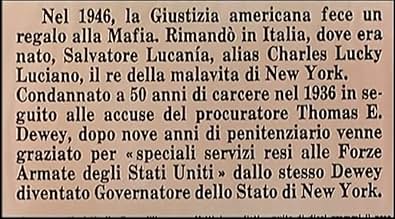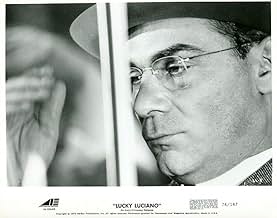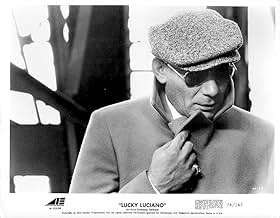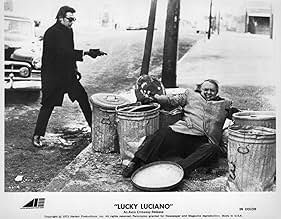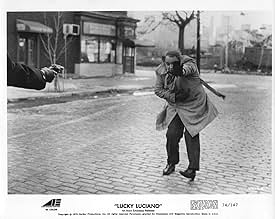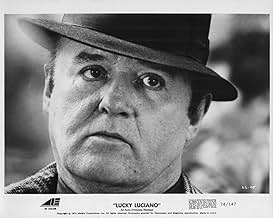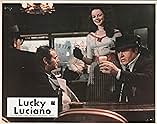AVALIAÇÃO DA IMDb
6,4/10
1,7 mil
SUA AVALIAÇÃO
Adicionar um enredo no seu idiomaBiopic of Mafia boss Lucky Luciano, covering his life from 1946 to 1962 with occasional flashbacks.Biopic of Mafia boss Lucky Luciano, covering his life from 1946 to 1962 with occasional flashbacks.Biopic of Mafia boss Lucky Luciano, covering his life from 1946 to 1962 with occasional flashbacks.
- Direção
- Roteiristas
- Artistas
- Prêmios
- 2 vitórias e 2 indicações no total
Edmond O'Brien
- Commissioner Harry J. Anslinger
- (as Edmund O'Brien)
Avaliações em destaque
This biography of notorious American racketeer Charles "Lucky" Luciano would have probably worked better if they had made it into a TV mini-series which traced his entire life from his poverty-stricken childhood in Sicily to his rise to power in New York's gangster underworld to his extradition to Italy in 1946 and, finally, his death from a heart attack in 1962. As a 2-hour movie covering the events of his life in Italy after his extradition, it just doesn't work. There's not enough action (eg. shootouts and fistfights) to make it worth watching. Plus, it moves slowly and it's very talky. The English dubbing of the French and Italian actors is great, but not enough to sustain your interest.
Rent "The Godfather" movies instead.
Rating: *1/2
Rent "The Godfather" movies instead.
Rating: *1/2
This movie is boring. Plain boring, nothing else. And I've a great tolerance of movies that most people find boring.
I still wonder what I just watched. Is it a documentary? Most gangster films are pretty slow, but this one is more than that. All action happens in 15 minutes, then...nothing. It's like there was no editor, or that the material was shot for some kind of documentary.
Gian Maria Volontè plays his role very good. Rod Steiger is nice, but doesn't get enough time to be as great as he usually is. The rest of the cast is OK, not a problem here. Gangsters look like gangsters, cops look like cops and the dames are plenty.
For some seven years now I have been collecting gangster films, read books about the subject and even collected news articles about the mafia and such. Most of what I saw in this film is not new for me. Luciano was famous and is nothing short of legend these days. When he moved out of the US, he kind of got into the darkness. When this film dragged on, I saw some potential stories come by, but all just passed and went on. So nothing happened until the end where that thing happened that everyone that ever read a book about the mafia knows that happened.
The soundtrack doesn't help. Piero Piccioni can't even live up to his usual 'clone morricone' music and seems only to have written about 7 minutes of music.
The DVD I got was a UK version without any subtitle. I can watch English spoken films without much trouble, but half of this is in Italian, so beware! At first I feared this would have been a action movie disguised as a gangster film, but even that wasn't true. It is slow and all that. Of course, I never thought I was going to watch a true classic, but I almost felt asleep. Still, I cannot give it less than a 4. Gian Maria Volontè and Rod Steiger together in a film, and the sets were good enough. The production itself felt okay. So maybe they should have fired the writer and maybe the editor.
It could have been so much more!
I still wonder what I just watched. Is it a documentary? Most gangster films are pretty slow, but this one is more than that. All action happens in 15 minutes, then...nothing. It's like there was no editor, or that the material was shot for some kind of documentary.
Gian Maria Volontè plays his role very good. Rod Steiger is nice, but doesn't get enough time to be as great as he usually is. The rest of the cast is OK, not a problem here. Gangsters look like gangsters, cops look like cops and the dames are plenty.
For some seven years now I have been collecting gangster films, read books about the subject and even collected news articles about the mafia and such. Most of what I saw in this film is not new for me. Luciano was famous and is nothing short of legend these days. When he moved out of the US, he kind of got into the darkness. When this film dragged on, I saw some potential stories come by, but all just passed and went on. So nothing happened until the end where that thing happened that everyone that ever read a book about the mafia knows that happened.
The soundtrack doesn't help. Piero Piccioni can't even live up to his usual 'clone morricone' music and seems only to have written about 7 minutes of music.
The DVD I got was a UK version without any subtitle. I can watch English spoken films without much trouble, but half of this is in Italian, so beware! At first I feared this would have been a action movie disguised as a gangster film, but even that wasn't true. It is slow and all that. Of course, I never thought I was going to watch a true classic, but I almost felt asleep. Still, I cannot give it less than a 4. Gian Maria Volontè and Rod Steiger together in a film, and the sets were good enough. The production itself felt okay. So maybe they should have fired the writer and maybe the editor.
It could have been so much more!
A sort of biography of Lucky Luciano the Italian mobster who was deported to Italy by USA's government after years in the jail, directed by the fine Francesco Rosi, the movie starts in this point when Lucky Luciano (Gian Maria Volonté) has been headed toward to Sicily at Italy by boat, mixed with few flashbacks concerning his violence background, he established at Sicily his homeland and Naples, where he manages all drug smuggling targeted to Europe and America, at its time post war the whole Italy was occupied by USA's Army and all major positions were chosen by American authorities, suggesting some agreement with local corrupts practices, upon this establishment the smooth Luciano feels free to work hidden over the shadows and becoming untouchable, however the unrelenting traffic ongoing peeves the American justice, sending to Italy an inspector to catch Lucky Luciano, the casting is the highlight of the slow paced picture, Gian Maria Volonté simply is great as Lucky, the almost unknowable Edmund O'Brien as Commissioner Anslinger also Rod Steiger as akind cheap mobster and Vincent Gardenia as the corrupt Colonel Charles Poletti, but don't expect too much, has many striking flaws strangely allowed by Rosi as portraits a modern New York as if it was on 1946, I'm trying wondering how it should happened over so magnificent director!!!
Resume:
First watch: 2020 / How many: 1 / Source: DVD / Rating: 7
Resume:
First watch: 2020 / How many: 1 / Source: DVD / Rating: 7
I would say that i find crime films to be something of a guilty pleasure, from Paul Muni in Scareface (1932) to Marlon Brando in The Godfather (1972) and all the sub genders in between i am normally a fan and gangster films have held audiences interest for as long as the movies have talked. So it was a surprise to me that i found this film such a ordeal to get through, on my viewing copy the language used is Italian and English in equal measure where appropriate, this adds authenticity but since i do not understand Italian, much of this speech dominated film simply passed me bye and there were no sub titles to help out.I also found it's time shifting narrative very confusing as the film did not give us many dates to hang on to. This is i suppose a thinking man's gangster film, i wish i had enjoyed it more for the acting from a unknown cast seemed first rate.A pity but just 5 from 10 from me.
If you want to watch Gian Maria, the greatest actor of all time, at his best, watch him in "Investigation of a Citizen Above Suspicion", "Le Cercle Rouge", "For a Few Dollars More" or "I Am Afraid", he worked much much better with Petri, Melville, Leone and Damiani. This one is very boring and Volontè doesn't appear much. And when he appears, he has the same face that does not say too much. This role did not quite fit him. Rosi's films, most of them, are a special genre, very close to the documentary, very hard to follow, you got to have a patience of steel...
Você sabia?
- CuriosidadesIn Senses of Cinema's translation of an interview with film critic Michel Ciment for 'Le Dossier Rosi' (1976), director Francesco Rosi said of Charles Siragusa's war against Lucky Luciano: "He feels like the victim of a conspiracy he can't quite comprehend . . . that someone or something is stopping him from carrying out his work the way he wants to".
- Erros de gravaçãoWhen Lucky Luciano is deported in the mid-Forties, far more modern buildings can be seen on the New York skyline.
- ConexõesFeatured in Diario napoletano (1992)
Principais escolhas
Faça login para avaliar e ver a lista de recomendações personalizadas
- How long is Lucky Luciano?Fornecido pela Alexa
Detalhes
- Data de lançamento
- Países de origem
- Idiomas
- Também conhecido como
- Lucky Luciano
- Locações de filme
- Genova, Liguria, Itália(Docks)
- Empresas de produção
- Consulte mais créditos da empresa na IMDbPro
Contribua para esta página
Sugerir uma alteração ou adicionar conteúdo ausente

